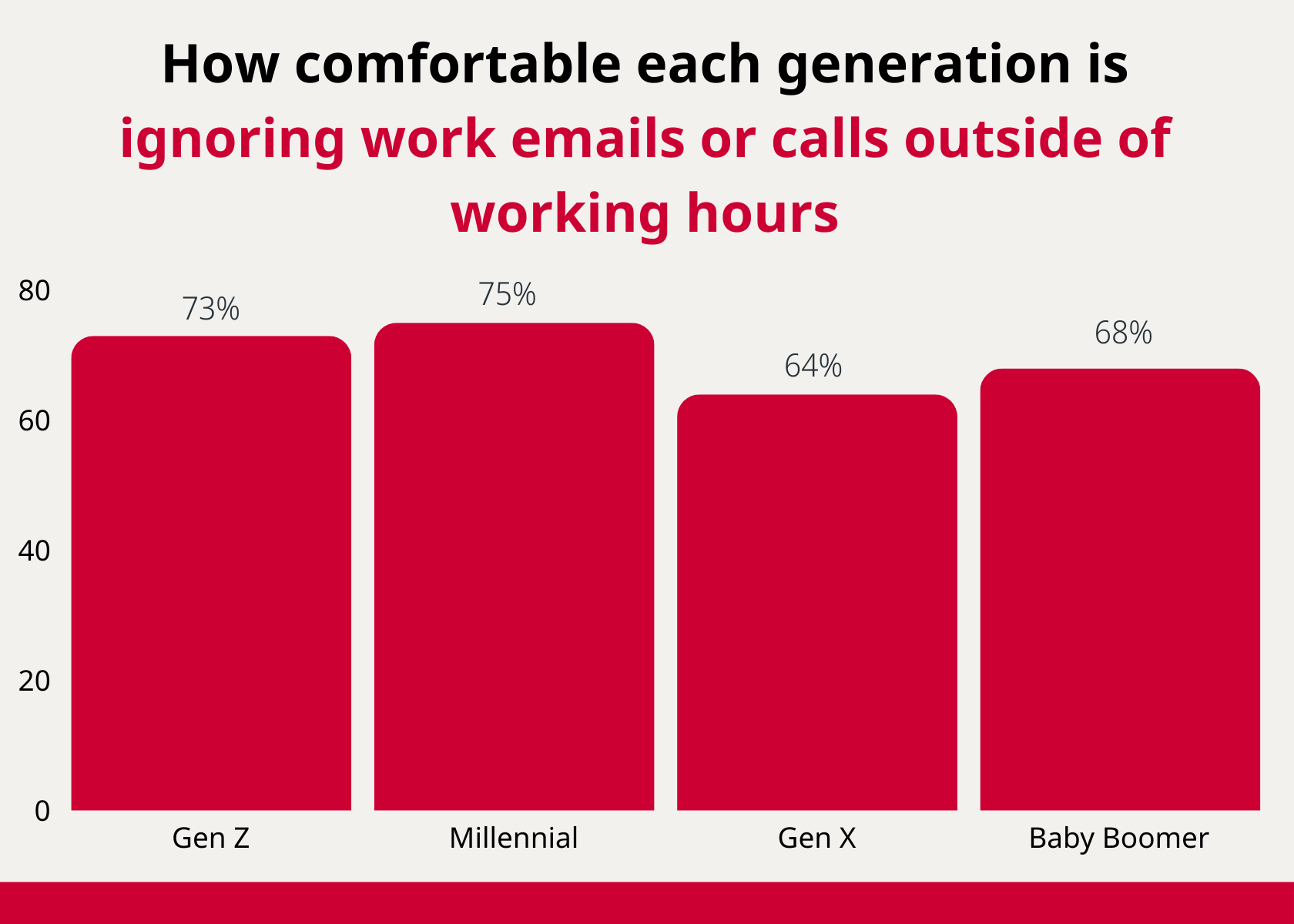Work, work, work.
It's the reason you've gone AWOL from the gym, missed your dental appointment, and find yourself working even when the workday is done.
While life carries on for everyone else, you're still chipping away after hours, as another evening slowly ebbs away, and you wonder “How can I regain my time back?”
And it isn’t just you – whether at home or in the office, Australian employees are striving to get their jobs done but it seems that time management has gone out the window. You might love your role and the challenges it brings, but have you managed to find the right work-life balance?
Without the necessary rest and recuperation - and time for family, social or leisure pursuits – you simply won’t be as productive as you need to be day-by-day. Little errors can creep in, your enthusiasm for work may start to wane, and your mental health can take a hit.
In comes the new ‘right to disconnect’.
The new 'right to disconnect' is generating buzz in workplaces across Australia, and for good reason. It promises a much-needed shift in the nation’s work culture, empowering employees to disconnect from work to reclaim their personal time and achieve a healthier work-life balance.
If you're wondering what this new right entails, how it might impact your ability to switch off from work, or simply curious about the buzz, you've come to the right place.
In this blog, we explore the specifics of the right to disconnect, answering your burning questions about its scope, exceptions, enforcement, and the implications for both employees and employers.
Whether you're seeking clarity on what this right entails or want to navigate this new terrain in workplace laws, this blog will equip you with the knowledge you need to embrace the 'right to disconnect'.
What is the ‘right to disconnect’?
From August 26th, 2024, eligible employees will have the right to refuse employer or third-party contact outside of their working hours, unless that refusal is unreasonable. The ‘right to disconnect’ is an amendment to the Fair Work Act and comes as a response to employee mental health concerns.
This will give employees a right to refuse to monitor, read or respond to act from their employer or a other third party outside their working hours unless that refusal is unreasonable.
To determine whether an employee’s refusal is unreasonable will depend upon the individual circumstances, considering factors such as:
The reason for contact
Whether the employee is compensated or paid extra for being available to be contacted to perform work within a specific period, or working additional hours outside their ordinary hours of work
The nature of the employee’s role and level of responsibility
The employee’s personal circumstances, including family or caring responsibilities.
Note that there is no restriction on an employer continuing to reach out to /contact an employee after hours/outside of the usual working hours. The right to disconnect will also be a workplace right under the general protection provisions of the Fair Work Act.
“The right to disconnect is a game changer for work-life harmony in Australia,” says Nicole Gorton, Director at Robert Half.
As a workplace expert with more than two decades of experience, Nicole sees this legislative amendment as a monumental shift for workers.
“It empowers employees to reclaim their personal time and disconnect from the potential pressure of work-related communication, something we hear often from candidates who look for balance in a role. Our recent observations of increased burnout and stress among employees from after-hours contact will soon lessen and improve employee morale and reduce turnover. The 'right to disconnect' is not just a new rule, it's a cultural shift, further emphasising the increased focus on employee wellbeing and mental health.”
Related: Could working overtime make you less productive
What impact will the ‘right to disconnect’ have on Australian workers?
According to Robert Half research conducted in June 2024 among 1000 full-time office workers, the ‘right to disconnect’ amendments to the Fair Work Act will directly impact 87% of office workers who say they are contacted outside of work hours.
More than a third (36%) are contacted more than once a week. Only 13% of office workers say they are never contacted by their employer outside of work hours, meaning these changes may alleviate the need to monitor or respond to these communications and may positively impact Australian workers, particularly in improving their work-life balance and mental wellbeing.
1. Improved work-life balance
With the ‘right to disconnect’ allowing employees to refuse contact outside their working hours unless that refusal is unreasonable, workers may have more control over their personal time, allowing them to dedicate time to family, hobbies, and relaxation, thus promoting a healthier work-life balance.
According to the Robert Half research, improved work-life balance will be the biggest positive effect to come from the ‘right to disconnect’ with 68% of workers agreeing this will be the case.
With work-life harmony being in the spotlight since the COVID-19 pandemic, keeping the scale balanced on work time and personal time is a priority for most workers. And it is proven to have positive effects on employee satisfaction, morale and retention rates.
2. Reduced stress and burnout
Reduced stress and burnout are cited by 55% of Aussie workers who say the ‘right to disconnect’ will help positively manage their levels of mental exhaustion.
By enabling employees to switch off after hours without the pressure to respond to work communications, it can lead to reduced stress levels and help prevent burnout. It can also encourage workers to engage in less screen time and spend more of their hours doing physical activity or staying connected with friends and family.
Workers who do not experience high levels of stress on a regular basis and burnout are more likely to thrive in their role, which has desirable impacts on both the employee and the business they work for.
3. Increased job satisfaction
“As cited by workers themselves, the ‘right to disconnect’ is expected to significantly improve employee wellbeing and job satisfaction,” says Gorton. “When employees feel empowered and have control over their time, they're generally more engaged and productive during work hours.
In fact, 43% of workers in Australia say their job satisfaction will increase because of the ‘right to disconnect’ coming into play this year.
4. Improved productivity during business hours
One-third (31%) of Aussie workers say they will experience improved productivity during business hours, knowing that tending to work after hours is not encouraged. Their work patterns will likely change, which will see them prioritise their urgent tasks earlier in the day and assess their workload to see how to better plan out their day.
It is worth acknowledging that 72% of employees do expect some challenges that may come with the ‘right to disconnect’, including increased pressure to complete tasks within regular working hours (35%).
“For businesses, this amendment to the Fair Work Act requires a shift in mindset and communication practices, creating an opportunity to build a healthier workplace culture that prioritises employee wellbeing. For those businesses who rely heavily on after-hours availability, there will be increased focus on delivering more efficient and streamlined operations.
“This will also open up new conversations between companies and staff about work expectations and company culture, leading to stronger long-term success,” concluded Gorton.
The ‘right to disconnect’ in Australia – how comfortable are workers to stick to it?
Once the Fair Work Act amendments come into effect, most workers (70%) say they will be comfortable ignoring work emails and phone calls after hours. Only 15% indicate they will not feel comfortable. The remaining 15% feel indifferent for the right to switch off in Australia.
In a sign of generational attitudes towards digital communication and work-life balance, Millennials (75%) are the most comfortable about ignoring work-related contact after hours, closely followed by Gen Z (73%). Baby Boomers (68%) and Gen X (64%) are a little less comfortable avoiding after-hours contact.
Overall, the 'right to disconnect' is a significant step towards promoting a healthier work culture in Australia. While it might require some adjustments in the way work is managed, its potential benefits for employees' mental wellbeing and work-life balance are considerable.
Frequently Asked Questions (FAQs)
What is the right to disconnect law in Australia?
Eligible employees will have the right to not monitor, read or respond to contact from employer or third-party contact outside of working hours in some circumstances.
When does the right to disconnect come into effect?
26 August 2024 for non-small business employers26 August 2025 for small business employers.
What does the right to disconnect mean?
The ‘right to disconnect’ means an employee can refuse to monitor, read or respond to contact from an employer or a third party outside of their working hours unless that refusal is unreasonable.
Does the right to disconnect apply to all employees?
It applies to eligible employees. Visit the Fair Work site to see if you are eligible.
Can employers still contact employees outside of work hours?
Employers can still contact employees outside of work hours, but employees will have the right to refuse to monitor, read or respond to contact unless that refusal is unreasonable.
How can I enforce my right to disconnect?
You can refuse employer or third-party contact outside of working hours unless that refusal is unreasonable.
What if my employer continues to contact me outside of work hours?
Disputes about an employee’s right to disconnect should first be discussed and resolved at the workplace level. If that isn’t possible, employees or employers can go to the Fair Work Commission (the Commission) to deal with a dispute.
Does the right to disconnect mean I can't work overtime?
No, the right to disconnect does not mean you can’t work overtime.
What if I'm on call? Does this affect my right to disconnect?
Several factors must be considered when determining whether an employee’s refusal is unreasonable. If you are compensated or paid extra for being available to be contacted to perform work within a specific period, then this does affect your right to disconnect.
Can I still be contacted for urgent matters outside of work hours?
Yes, you can still be contacted for urgent matters outside of normal work hours.








